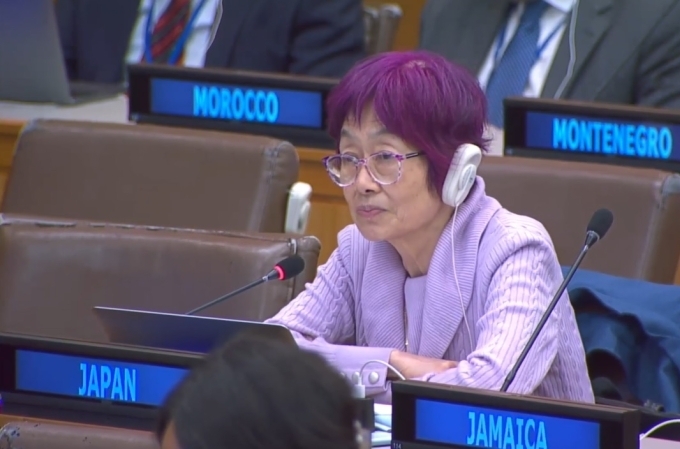第79回国連総会第3委員会議題27「女性の地位向上」に関する紙谷政府代表顧問ステートメント
令和6年10月9日

(As delivered)
Madam Chair,
First, I will refrain from repeating our well-known position, but I have to state that the earlier reference by North Korea about Japan is erroneous and groundless, and it is therefore not acceptable.
Each and every country and region should squarely face its own history with humility. This is exactly what Japan has been doing, and has proven by the path it has walked as a peace-loving nation since the end of World War II.
Japan has consistently respected democracy and human rights and contributed to peace and prosperity in the Asia-Pacific region and the international community for nearly 80 years.
Madam Chair,
As I address this session on the “Advancement of Women,” I wish to emphasize that I am present here in my role as the Special Advisor to the Japanese delegation based on the recommendations put forth by Japanese women’s NGOs, a tradition that has endured since 1957. The Government of Japan also appoints a civil society representative to its delegation to the Commission on the Status of Women and has been co-hosting side events during its session.
Madam Chair,
Next year marks the 30th anniversary of the Fourth World Conference on Women and the adoption of the Beijing Declaration and Platform for Action. Japan has consistently and steadfastly advanced efforts to improve the status of women domestically.
Each year, the Government of Japan adopts the “Basic Policy on Gender Equality and Empowerment of Women." Under the 2024 policy, the government is promoting empowerment initiatives such as setting numerical targets for the proportion of female executives, reskilling initiatives focused on expanding women’s participation in digital fields, and strengthening measures against spousal violence.
In addition, in April this year, the “Act on Support for Women Facing Difficulties” came into effect. This crucial law addresses various intersectional issues such as poverty and sexual violence by fostering collaboration between public and private sectors.
Madam Chair,
The year 2025 will also mark the 25th anniversary of the landmark Security Council resolution 1325 on women, peace and security. As global conflicts persist, the urgency of advancing the WPS agenda has never been more pronounced.
As a member of the Security Council, Japan has promoted the WPS agenda both within the Council and across the UN system. The WPS agenda has become one of the main pillars of Japan’s foreign policy, and in 2025, Japan will co-chair the WPS Focal Points Network with Norway, hosting the Capital Level Meeting in Tokyo in February.
In conclusion, Japan remains firmly committed to advancing the status of women and will continue to be an active contributor to this agenda within the Third Committee and beyond, in pursuit of women’s empowerment worldwide.
I thank you.
First, I will refrain from repeating our well-known position, but I have to state that the earlier reference by North Korea about Japan is erroneous and groundless, and it is therefore not acceptable.
Each and every country and region should squarely face its own history with humility. This is exactly what Japan has been doing, and has proven by the path it has walked as a peace-loving nation since the end of World War II.
Japan has consistently respected democracy and human rights and contributed to peace and prosperity in the Asia-Pacific region and the international community for nearly 80 years.
Madam Chair,
As I address this session on the “Advancement of Women,” I wish to emphasize that I am present here in my role as the Special Advisor to the Japanese delegation based on the recommendations put forth by Japanese women’s NGOs, a tradition that has endured since 1957. The Government of Japan also appoints a civil society representative to its delegation to the Commission on the Status of Women and has been co-hosting side events during its session.
Madam Chair,
Next year marks the 30th anniversary of the Fourth World Conference on Women and the adoption of the Beijing Declaration and Platform for Action. Japan has consistently and steadfastly advanced efforts to improve the status of women domestically.
Each year, the Government of Japan adopts the “Basic Policy on Gender Equality and Empowerment of Women." Under the 2024 policy, the government is promoting empowerment initiatives such as setting numerical targets for the proportion of female executives, reskilling initiatives focused on expanding women’s participation in digital fields, and strengthening measures against spousal violence.
In addition, in April this year, the “Act on Support for Women Facing Difficulties” came into effect. This crucial law addresses various intersectional issues such as poverty and sexual violence by fostering collaboration between public and private sectors.
Madam Chair,
The year 2025 will also mark the 25th anniversary of the landmark Security Council resolution 1325 on women, peace and security. As global conflicts persist, the urgency of advancing the WPS agenda has never been more pronounced.
As a member of the Security Council, Japan has promoted the WPS agenda both within the Council and across the UN system. The WPS agenda has become one of the main pillars of Japan’s foreign policy, and in 2025, Japan will co-chair the WPS Focal Points Network with Norway, hosting the Capital Level Meeting in Tokyo in February.
In conclusion, Japan remains firmly committed to advancing the status of women and will continue to be an active contributor to this agenda within the Third Committee and beyond, in pursuit of women’s empowerment worldwide.
I thank you.
